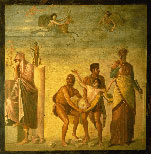
Coursework:
Students are expected to pass the normal Greek and Latin competency exams upon entrance to the program. They will complete sixteen term courses. Eight of these will be courses in Classics and will include at least four courses in Greek and Latin literature, a course in historical or comparative grammar, and at least three seminars. The eight remaining courses making up the Renaissance Studies portion of the degree will be broken down as follows: 2 terms of Renaissance Studies Core Course, 6 additional term courses to be taken in at least two disciplines (such as Literature, History, History of Art, Music, Religious Studies, etc.). One of these courses should respect the spirit of the ordinary Classics requirement of a course in classical art or archaeology (a course on the classical origins of Renaissance architecture, for example, will satisfy this requirement).
Language Requirement:
Italian, as set by Renaissance Studies – one hour of sixteenth-century Italian prose, one of modern Italian scholarship – and a second language, normally German or French.
Exams and related matters:
Students are expected to pass the Greek and Latin translation exams, based on the Classics and Renaissance Studies Ph.D. reading lists, by the beginning of the fifth term in residence, the oral exams in Greek and Latin literature, based on the Classics and Renaissance Studies Ph.D. reading lists, by the end of the fifth term in residence, the oral exams on special fields appropriate to both disciplines, as described below, by the end of the sixth term in residence, and the dissertation prospectus by the end of the seventh term in residence.
Oral Examination on Special Fields Appropriate to Both Disciplines:
Classics portion: 75 minutes on three or four topics in classical Greek and Latin literature. Renaissance Studies portion: 45 minutes, 3 15-minute questions on Renaissance topics to be divided between at least two disciplines, i.e., literature, history, history of art, etc.
Dissertation:
Procedures regarding the dissertation will follow departmental practice, though the board of readers will normally include at least one member of the Renaissance Studies Executive Committee.